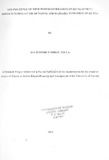| dc.description.abstract | This study aimed at investigating the influence of wind power generation on development opportunities: A case of Ngong and Marsabit wind firms in Kenya.
Global and regional literature revealed that quality and quantity of wind power produced (power ration, blackout, power surge, equipments used, production), market demand/consumption (no. of connection, inquires for connection, alternatives, awareness, literacy level), accessibility of the power to the customer/market (distance, transmission media, available infrastructure) are important determinants of development opportunities (reduced insecurity, employment, good infrastructure, improved living conditions, enhanced education) from wind energy generation projects. These factors were evaluated by this study for the case of Kenya. Causal and descriptive designs were followed to conduct a survey from 275 heads of households from Ngong and Marsabit regions and other stakeholders (heads of wind energy at Kengen and Kenya Power) selected using stratified random sampling method.
Qualitative and quantitative techniques were followed in analyzing the data. Results revealed that wind firm generation results in development opportunities for both Ngong and Marsabit. But one key determinant of location of such projects is the speed of wind and we suggest that government should plan to exploit wind in wind intense areas, especially North and Upper East of the country. Other factors constraining development of wind and other renewable energy include demand and inertia of the Kenyan grid. This also needs to be enhanced through initiatives that elevate purchasing power of citizens, developing energy infrastructure and interconnecting with neighboring states (Tanzania, Uganda, Zambia, Rwanda, Burundi, Ethiopia and Sudan) in the long term. Finally, wind is seen to be one among other crucial forms of energy - like geothermal and solar - which Kenya can focus on in the coming days. Relevant government ministries should develop a business operating environment that is conducive for private sector investment in wind and other renewable forms of energy. | en_US |

